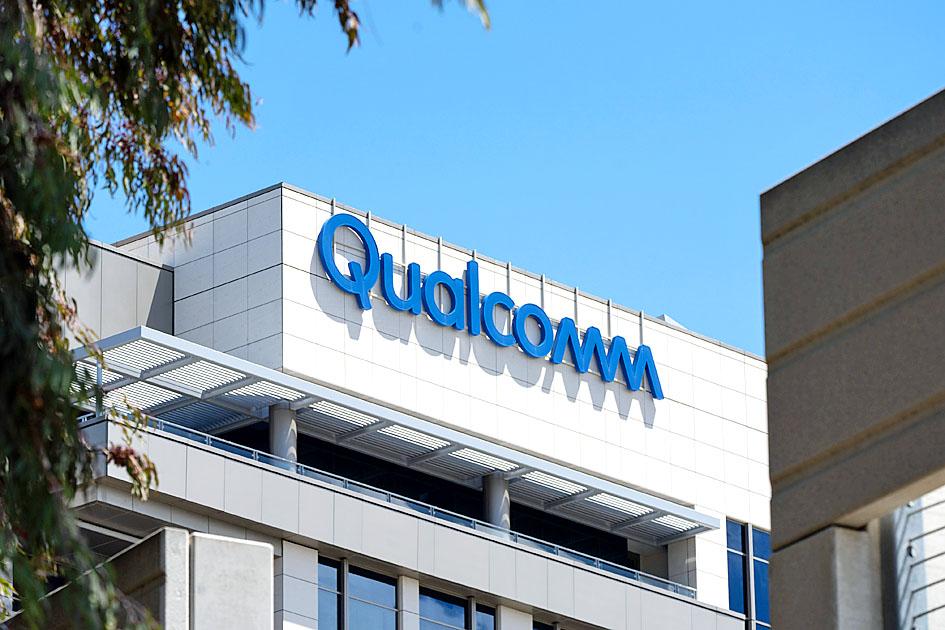Qualcomm Inc yesterday said that it is working with local partners, including Acer Inc (宏碁), to supply new Snapdragon processors for 5G-enabled laptops in its bid to challenge industry leader Intel Corp and expand its presence in the computer market.
The US chipmaker entered the notebook computer market four-and-a-half years ago with Microsoft Corp, but did not achieve as much market uptake as it had hoped.
Together with Microsoft and Google Inc’s Chrome, Qualcomm aims to transfer all top-class and essential applications on mobile phones to laptop computers, said Alex Katouzian, a senior vice president and general manager of Qualcomm Technologies Inc’s mobile business.

Photo: Bing Guan, Bloomberg
The firm said its Snapdragon processors give laptops good artificial intelligence, videoconferencing and audio capabilities, along with a long battery life.
Those were the lessons Qualcomm learned in partnering with Microsoft and Google, Katouzian told a virtual media briefing for the Computex Taipei trade show.
With the new processors, Qualcomm is targeting every tier, from thin and light notebooks to Chromebooks and from entry-level to premium models, except for the gaming segment, he said.
Qualcomm announced its partnership with Acer, which is to use the Snapdragon 8cx Generation 2 5G Compute Platform to enable laptop users to use 5G millimeter wave or sub-6 gigahertz 5G technology to connect to the Internet.
During the virtual briefing, the Hsinchu-based Acer showcased four Windows 10 laptops operating on Snapdragon processors.
Qualcomm said that it would not rule out the possibility of extending its Snapdragon product line to desktops.
“Our roadmap does not currently address desktop PCs, but it is not a closed matter,” Katouzian said.
Qualcomm Technologies has entered into a definitive agreement to acquire semiconductor start-up Nuvia Inc for about US$1.4 billion, he said, adding that desktop computers “could be a category that we apply our technologies to and integrate with our SoC [system on a chip] later, but at this point we don’t have any plan.”
Nuvia has a central processing unit and technology design team, with strong expertise in SoCs, high-performance processors and power management for compute-intensive devices and applications, Qualcomm said.

Zhang Yazhou was sitting in the passenger seat of her Tesla Model 3 when she said she heard her father’s panicked voice: The brakes do not work. Approaching a red light, her father swerved around two cars before plowing into a sport utility vehicle and a sedan, and crashing into a large concrete barrier. Stunned, Zhang gazed at the deflating airbag in front of her. She could never have imagined what was to come: Tesla Inc sued her for defamation for complaining publicly about the vehicles brakes — and won. A Chinese court ordered Zhang to pay more than US$23,000 in

Taiwan Semiconductor Manufacturing Co (TSMC, 台積電) yesterday said that its investment plan in Arizona is going according to schedule, following a local media report claiming that the company is planning to break ground on its third wafer fab in the US in June. In a statement, TSMC said it does not comment on market speculation, but that its investments in Arizona are proceeding well. TSMC is investing more than US$65 billion in Arizona to build three advanced wafer fabs. The first one has started production using the 4-nanometer (nm) process, while the second one would start mass production using the

‘NO DISRUPTION’: A US trade association said that it was ready to work with the US administration to streamline the program’s requirements and achieve shared goals The White House is seeking to renegotiate US CHIPS and Science Act awards and has signaled delays to some upcoming semiconductor disbursements, two sources familiar with the matter told reporters. The people, along with a third source, said that the new US administration is reviewing the projects awarded under the 2022 law, meant to boost US domestic semiconductor output with US$39 billion in subsidies. Washington plans to renegotiate some of the deals after assessing and changing current requirements, the sources said. The extent of the possible changes and how they would affect agreements already finalized was not immediately clear. It was not known

A TAIWAN DEAL: TSMC is in early talks to fully operate Intel’s US semiconductor factories in a deal first raised by Trump officials, but Intel’s interest is uncertain Broadcom Inc has had informal talks with its advisers about making a bid for Intel Corp’s chip-design and marketing business, the Wall Street Journal reported, citing people familiar with the matter. Nothing has been submitted to Intel and Broadcom could decide not to pursue a deal, according to the Journal. Bloomberg News earlier reported that Taiwan Semiconductor Manufacturing Co (TSMC, 台積電) is in early talks for a controlling stake in Intel’s factories at the request of officials at US President Donald Trump’s administration, as the president looks to boost US manufacturing and maintain the country’s leadership in critical technologies. Trump officials raised the